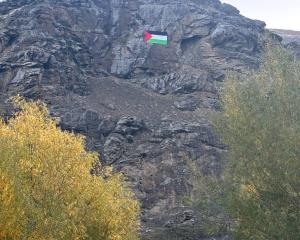A Cromwell farmer's desperate attempt to save his 1000-tonne fruit crop from a severe frost by burning rubber tyres generated a plume of toxic smoke and led to a conviction in the Environment Court in Dunedin yesterday.
Trevor Joseph Leyser, company director, of Cromwell, burnt up to 80 tyres on his Ripponvale Rd orchard and farm, near Cromwell, over several hours from 2am on November 8 last year, the court heard yesterday.
The tyres, in 15 or 20 stacks, were burnt in an unsuccessful bid to protect two blocks of Leyser's 16ha orchard, which was part of a larger 243ha farm, from freezing temperatures of -3.5degC.
The crop could not be saved, but the fires sent a plume of toxic smoke across neighbouring properties and coated a helicopter frost-fighting on a neighbouring property in black soot, leading to a complaint, the court heard.
Yesterday, Leyser was convicted and discharged after admitting discharging contaminants into the air in breach of Otago Regional Council rules on air quality.
He was ordered to pay court costs of $135 and solicitors fees of $113.
Leyser Brothers Ltd - the company of which Leyser and his brother were co-directors - also admitted the same charge through defence counsel Joe O'Neill.
The company was fined $3400 and ordered to pay Otago Regional Council costs of $1161.20, court costs of $131 and solicitor's fees of $113.
Summing up yesterday, Judge Gordon Whiting said the events in question needed to be seen in the context of the situation.
Frost-fighting was a major part of the orchard's operation between September and November each year, and the night's fires had occurred as Leyser and his orchard staff dealt with their 37th frost of the season.
All but two of the orchard's blocks were protected from frost by diesel and wood burners, while the two unprotected blocks had not experienced frosts in the Leysers' 37 years of farming the property, he said.
The decision to burn the tyres was made quickly, in the early hours of the morning, after frost alarms were activated.
However, the council's rules were in place because the burning of tyres created emissions containing hazardous levels of carbon monoxide and dioxins, he said.
Dioxins were known to cause cancer, birth defects, reproductive and developmental problems.
A report found the fires had produced a significant quantity of smoke and air pollution, but the short duration of the fires, wind conditions and a high inversion layer meant adverse effects were unlikely, he said.
The smoke had blown above neighbouring properties to the south, but not towards nearby Cromwell, until a change in wind direction took the smoke over unpopulated areas, he said.
The maximum penalty for each charge was three years' imprisonment or a $200,000 fine, but it was accepted a smaller fine was appropriate, he said.
Burning the tyres was a "rash decision" made under "extreme pressure", without knowledge of ORC rules prohibiting the burning of tyres, he said.
"I accept all that."
Judge Whiting also accepted Leyser was "extremely community-minded and a good family man", after hearing Leyser had been awarded the Central Otago District Council's community service award in 2002.
Leyser, who had no previous convictions, was involved in various community initiatives, and through his company employed 44 staff.
He was co-operative when spoken to, admitted his guilt at the earliest opportunity and had shown "true remorse", Judge Whiting said.











